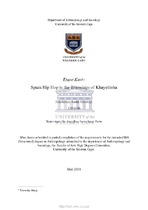Spaza Hip hop in the townships of Khayelitsha
Abstract
Since the arrival of hip-hop in Cape Town and indeed South Africa in the 1980s, a diverse
and vibrant range of hip-hop sub-genres has developed in Cape Town. Scholarship, however,
have approached hip-hop mainly through a linguistical angle focusing mostly on Cipha hiphop
in the Cape Flats. This ethnographic work looks at performances and practices of Spaza
hip-hop. It explores the musical genre of Spaza hip-hop in the township of Khayelitsha,
discussing ideas advanced by scholarship almost ten years ago and re-assessing issues of
language, citizenship and ethnicity from today’s perspective. It looks at Spaza hip-hop not
only as a musical genre, as it explores questions of identity, ethnicity, race, and gender. My
research discusses how Spaza hip-hop music is consumed today, how it is produced and how
it circulates. Across two years of fieldwork, I followed park sessions, open mic sessions and
events; I have interviewed artists, producers and audiences. I argue that Spaza hip-hop in
2018 had changed drastically from its first apparition. Not only most of the artists are now
older, but also the Spaza hip-hop scene is now invaded by trap hip-hop artists. Across my
research I explore issues of gender in hip hop which is generally perceived as a “masculine”
music. I illustrate how female artists constantly challenge norms and negotiate a space of
their own, paradoxically transforming Spaza hip hop in a space for freedom.

